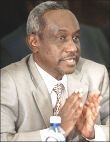Sudan regrets UN vote, accepts French troops on border
 KHARTOUM, Aug 1 (AFP) — The Sudanese government regrets a resolution by the UN Security Council giving it 30 days to resolve the crisis in its western Darfur region, Foreign Minister Mustafa Ismail said Sunday.
KHARTOUM, Aug 1 (AFP) — The Sudanese government regrets a resolution by the UN Security Council giving it 30 days to resolve the crisis in its western Darfur region, Foreign Minister Mustafa Ismail said Sunday.
He told reporters that the council of ministers, in a meeting Sunday chaired by First Vice President Ali Osman Taha, reviewed a detailed report he submitted on the resolution.
Khartoum has been under growing international pressure to rein in its forces and its Arab Janjaweed militia allies accused of mass killing, rape and other atrocities during a 17-month-long revolt in Darfur.
Initially Sudan rejected the UN resolution which warned Friday of international measures if it failed to meet the Security Council’s demands but as international pressure grew, it reluctantly accepted it.
Up to 50,000 people are reported dead and more than a million have fled their homes, 200,000 of them seeking refuge in neighbouring Chad.
Ismail said the cabinet criticised the resolution for placing the Darfur issue in an international framework instead of the regional one represented by the African Union and Chad.
Another aspect seen by the council of ministers as negative was that the Security Council “ignored the main cause of the Darfur incidents, that is, the rebel movement which was the first to lift up arms and must therefore be blamed for all the resulting humanitarian disasters,” Ismail said.
He said the resolution contained “gestures” about the responsibility of the rebel movement but “those gestures were not strong enough to place the whole responsibility upon the rebellion.”
Ismail, reporting the cabinet’s view, described as “illogical” the 30-day deadline when, he said, the agreement last month with UN Secretary General Kofi Annan specified 90 days for implementing the agreement.
Ismail said the council identified a number of positive points in the Security Council resolution, including appreciation of the joint communique issued by the Sudanese government and Annan on July 3.
Another positive aspect was an appeal to the international community to provide humanitarian assistance to Darfur, in addition to renewing its support for the peace agreement on south Sudan.
The ministers “renewed the government’s commitment to implementing the agreement that was concluded with the UN,” said Ismail, adding that the cabinet asked him to communicate in writing its position to the UN.
Ismail said the Sudanese government did not mind the presence of French troops along the Sudanese-Chadian border so long as it was coordinated with the Chadian government.
He added that his government maintained contact with the French and Chadian governments on the issue.
The French government said that it had been requested by the Chadian government to assist in distributing relief supplies to the Sudanese refugees and that is what the French troops would do.
The Sudanese ruling National Congress (NC) party voiced its support for an African role in solving the crisis in Darfur.
After a meeting with Hamid al-Ghabid, the African Union envoy for talks between Khartoum and the Darfur rebels who arrived here Sunday, NC Secretary General Ibrahim Ahmed Omar told reporters that his party backed the African efforts for resolving the Darfur crisis.
He said Ghabid told him that the African Union would play a major role in the settlement of the Darfur conflict and that he would conduct extensive consultations with the parties concerned for resumption of the negotiations.
